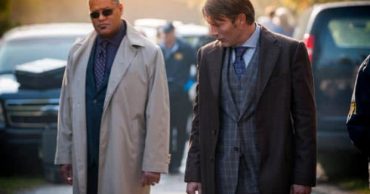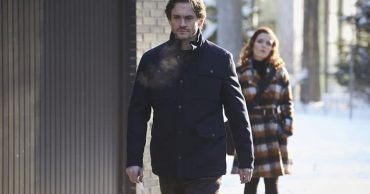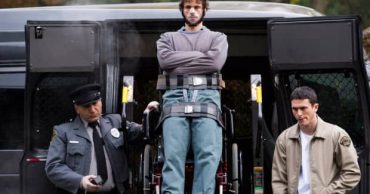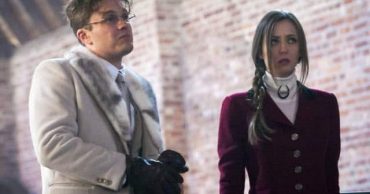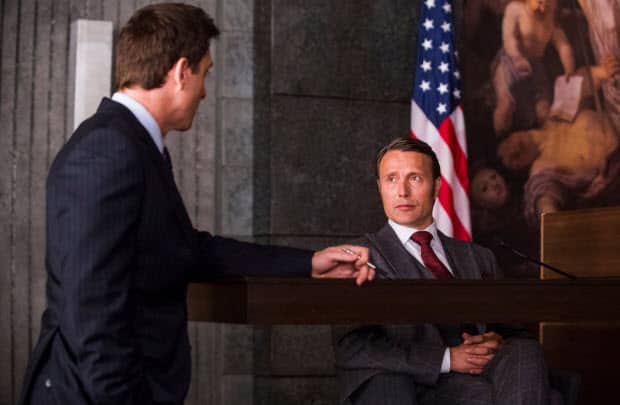
You can now add courtroom drama to the list of genres Hannibal has deftly mastered. Following in the wake of the Muralist two-parter, “Hassun” shifts the season’s focus to Will’s trial. Hannibal has earned every benefit of every doubt by creating works of art instead of simple scenes, but it’s still a little surprising how engaging the overused television setting of the courtroom is in this episode. There is theatricality, a collection of strong character moments, dark humor, social commentary and that familiar, haunting violence incorporated into the trial sequences and their aftermaths. “This isn’t law. It’s advertising,” Will’s defense attorney tells him, to which Will responds, “Advertising trivializes. It manipulates. It’s vulgar.” Unlike advertising, nothing about Hannibal trivializes or is trivial. Now more than ever, it’s apparent how incredibly important every piece of this puzzle is.
Detail is probably the best place to start in “Hassun,” which is full of rich symbols and genius turns of direction. In its first scene, we see Will rewind time during a projection of his execution. The clock moves backwards from a few minutes past twelve to the moment the hour hits and one of Will’s imagined versions of himself flips the kill switch. Clocks, of course, have been the source of a troubling image in this series before when Will is incapable of drawing one due to his psychological condition. Here, the clock signifies death, but opens the door to the possibility of reversing it (or maybe just re-living it over and over). Later in the episode, the camera pulls back from a shot of an ear in a Petri dish while turning clockwise. Instead of the hands of a clock, we get the ear of a clock in this other image of time and death. With any other series, that might be overreaching, but Hannibal is calling attention to this kind of detail. It’s no surprise, then, that the first line of dialog in the episode is “Mr. Graham, it’s time.” As if taking a cue from Hamlet‘s opening line – “Who’s there?” – the episode lays it all on the table from the get-go. Time is a huge factor in determining the fate of these characters. The delivery of the ear is perfectly timed. And, as we recall from the season opener, we’re on a pre-determined timer counting down to the moment when Jack confronts Hannibal.
There are other instances of visual storytelling, veering from the less obvious and maybe unintentional (Scott Thompson and Aaron Abrams’ names line up perfectly with the two glasses of whisky that Hannibal pours for Jack and himself) to the overtly thematic. “Not only is justice blind, it’s mindless and heartless,” Hannibal reacts to the display of the judge’s mutilated corpse. It’s heavy-handed, but it’s purposeful. Whoever the killer is (more on that below, because it might not be so obvious), being heavy-handed is in his nature or his design. While not the most gory and brutal moment of the episode (that goes to Will in his re-enactment when he creates the Glasgow Smile and cuts off the ear), it’s the one that draws the most artistry from its violence. The set up, including the chains that hook into the back and are attached to the wall, is perfectly crafted, much like Hannibal’s meals.
Getting back to the killer – and, by extension, the plot – I have to give a shout out to a friend who alerted me to something I had completely missed in the first two episodes of this season. I was curious about why we didn’t really get to know the Muralist in the same way that we did the killers of the first season. But my friend’s theory was that this season is no longer viewed through the perspective of Will Graham now that he is behind bars. Hannibal is now the viewpoint character, and he doesn’t see the killers as people he needs or wants to get to know. He maintains a cold, judgmental distance from them, and so we don’t get scenes of him getting into the Muralist’s head. We just see a vacuous form of a person that Hannibal can manipulate into a work of art. By that line of thought, I think there’s a question of who is committing the murders in this episode. The obvious choice is Hannibal, who is trying to get his friend exonerated so that he doesn’t have to sit opposite an empty chair in his study (and, to an extent, to convince Will of Hannibal’s innocence). Yet, if we are viewing these events through Hannibal’s point of view, the absence of scenes in which we see Hannibal commit the murders is conspicuous. It’s a manipulation of storytelling to withhold information that our viewpoint characters possess, and while this theory of perspective is just a theory, it’s convincing enough to me to consider that the tribute killer is someone other than the man played by Mads Mikkelsen.
Turning to two of Hannibal‘s other main characters, “Hassun” continues to give Jack Crawford some fantastic material and poses some interesting questions regarding Alana Bloom. The scene that comes after the credits in which Hannibal and Jack are conversing over whisky is a beautiful, touching distraction from the main events of the episode. Bella, Jack’s wife, is mentioned regarding her deteriorating condition. Jack is considering taking her to Italy to die (side note: poetry is also a recurring theme in “Hassun,” and for those who can’t recall their high school English classes, both Percy Shelley and John Keats – English poets – died in Italy). It’s the most blunt way of taking about the situation, and it’s Laurence Fishburne’s best scene here. As Hannibal tries to convince Jack to anchor himself in the FBI instead of following Bella to the grave, you almost forget it’s a serial killer talking because of how genuine he’s being with another human being, even if it might be all part of his grand plan in some way. The other great Jack scene is obviously is testimony, which goes against the wishes of the General Inspector by suggesting that he is at fault regarding Will. He’s the prosecutor’s witness and even after being told to represent the bureau’s beliefs, he can’t help but stand by his friend and take responsibility for his situation.
Following that, Alana, who was nearly entirely absent last week, struggles with her potential testimony, which she ends up not having to give. She’s taken aback by inquiries into the romantic component in her relationship with Will. “I have no romantic feelings for Will Graham. I have a professional curiosity.” The defense attorney is both entertained and satisfied by the response, convinced of its veracity by Alana’s face. But we’ve seen her deliver those rehearsed words before, and we know that she’s repressing more than just a curiosity for Will. Will asks her, “What do you want?” She pauses briefly before saying “I want to save you.” She’s thought of it before, and I’m sure she believes it. That need to “save” someone is typical of several different kinds of relationships, including familial ones. But it’s rarely one I would associate with a friendship that doesn’t have a romantic element to it. It’s interesting that that’s the last line of dialog in the episode before Will holds Alana’s hand. On first viewing, it seemed like an odd and abrupt place to finish, but it makes for a touching coda and an interesting transition into whatever is next to come. Alana is stubbornly convinced that Will is guilty (during an act of unconsciousness, though). Seeing that turn-around more than with any other character, including Jack, will be the most satisfying for me, because as weird as it is to admit it, I like seeing that love story in a series like Hannibal. It’s a very TV way of telling a story and it might not fit with the concerns of Bryan Fuller (Nic Pizzolatto certainly didn’t care about love in True Detective, which was to that show’s credit), but it’s something to root for in an otherwise bleak and disturbing universe.
There’s dozens of other interesting lines of dialog or images that the camera lingers on in “Hassun,” but rather than tackle them frame-by-frame, I want to end by speculating on the most confusing scene for me. Late in the episode, Will has a vision in which his cell door is open and he sees his stag Patronus. But as he’s walking down the hall towards it, Hannibal appears behind him and calls to Will from just outside the open cell. He motions his hand, inviting Will back. This is through Will’s perspective, which is why it might be jarring for me, but the problem I had here was making sense of the contradictory desires of wanting to keep Will in custody and wanting to get Will out, which is what we see Hannibal trying to do in most of the episode. The dream/nightmare version of Hannibal seems to have his own agency in Will’s visions, so I’m not sure that it’s just Will thinking that Hannibal wants him to remain guilty. In fact, I don’t know if Will thinks that at all, because he clearly sees what’s happening and how convenient some of these events are at laying down the foundation for a way out. So, what exactly does Hannibal want right now, and is he being pulled in two very different directions? Only time will tell.
[Photo via Brooke Palmer/NBC]
 Follow Us
Follow Us
